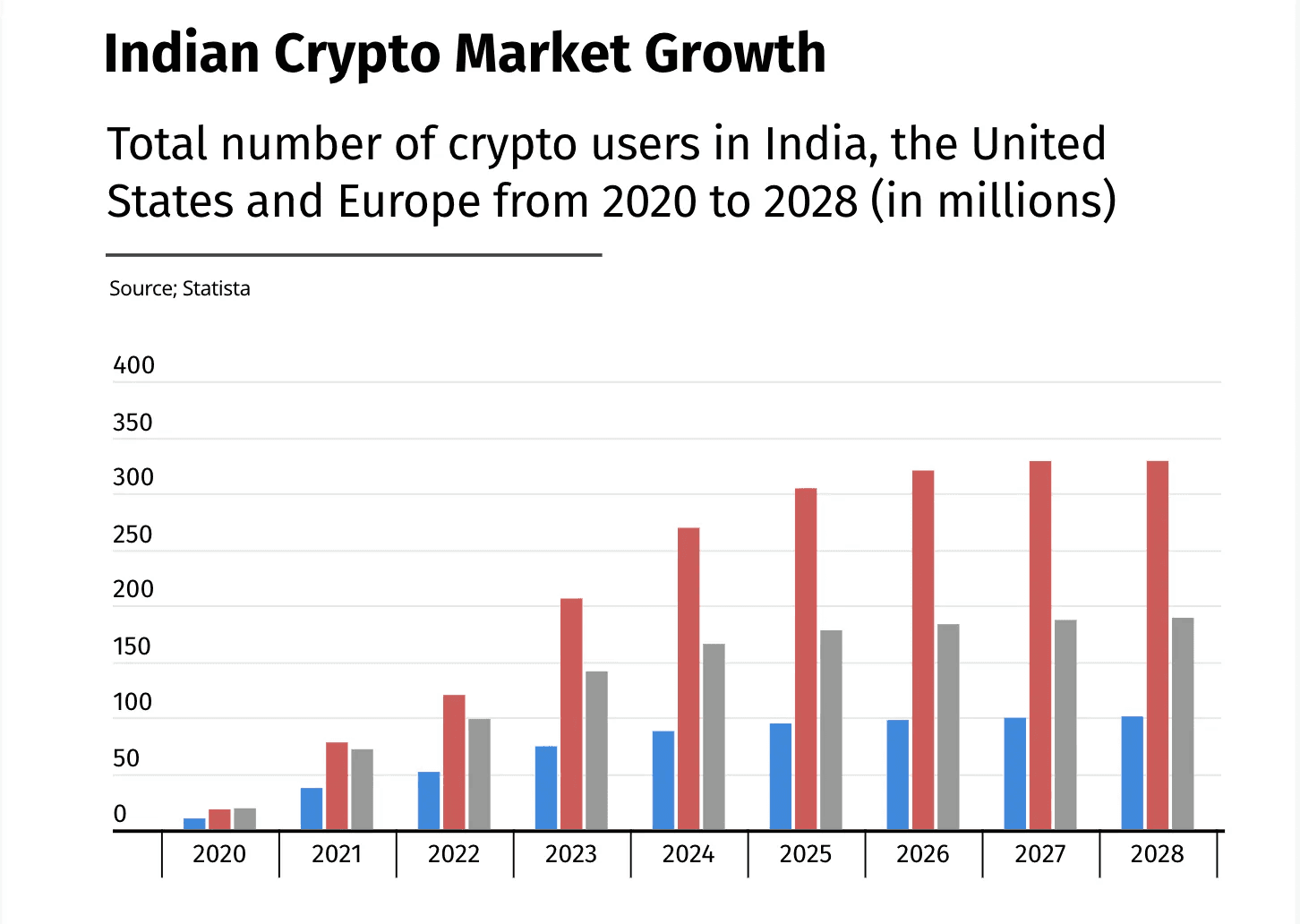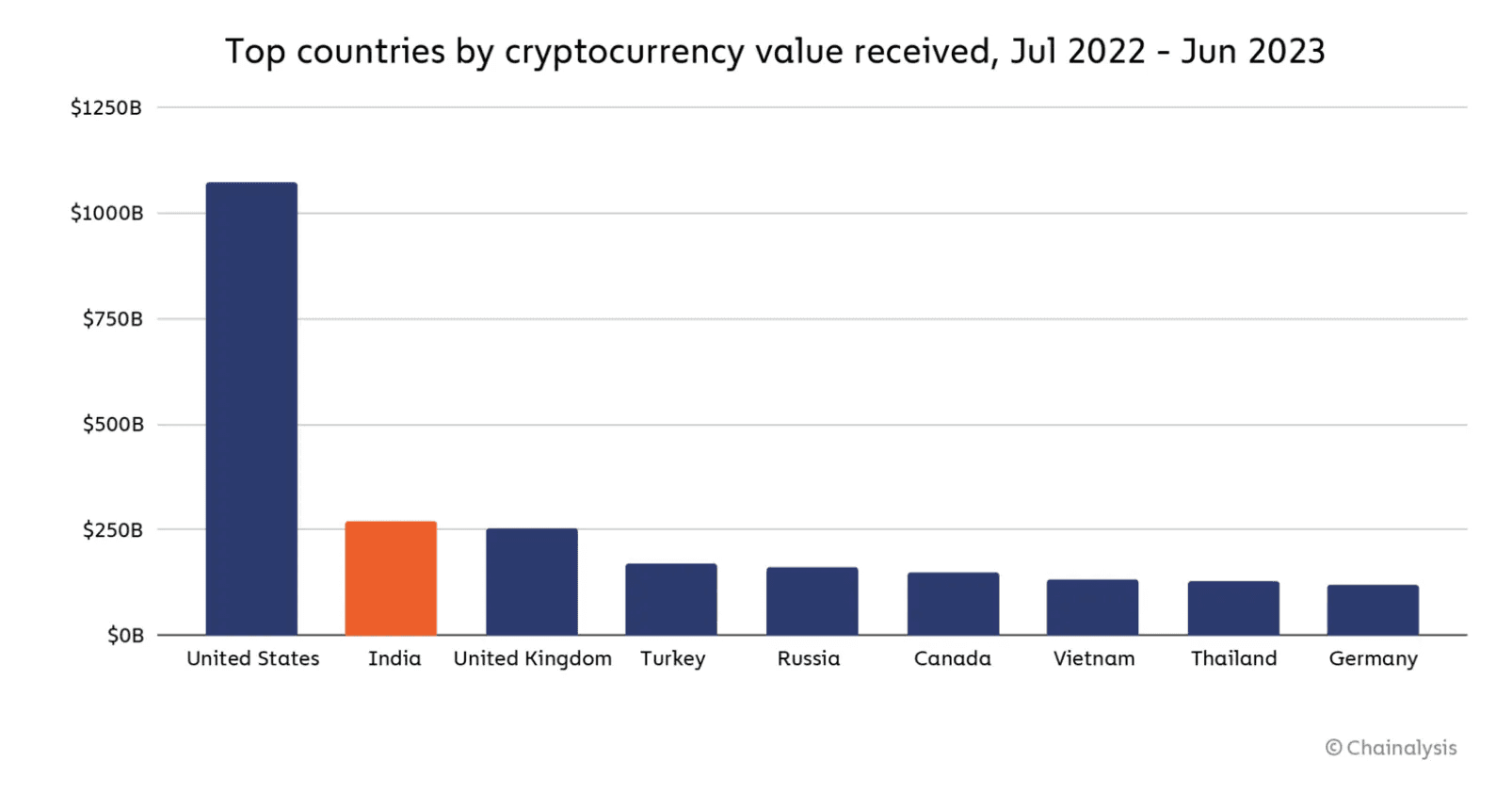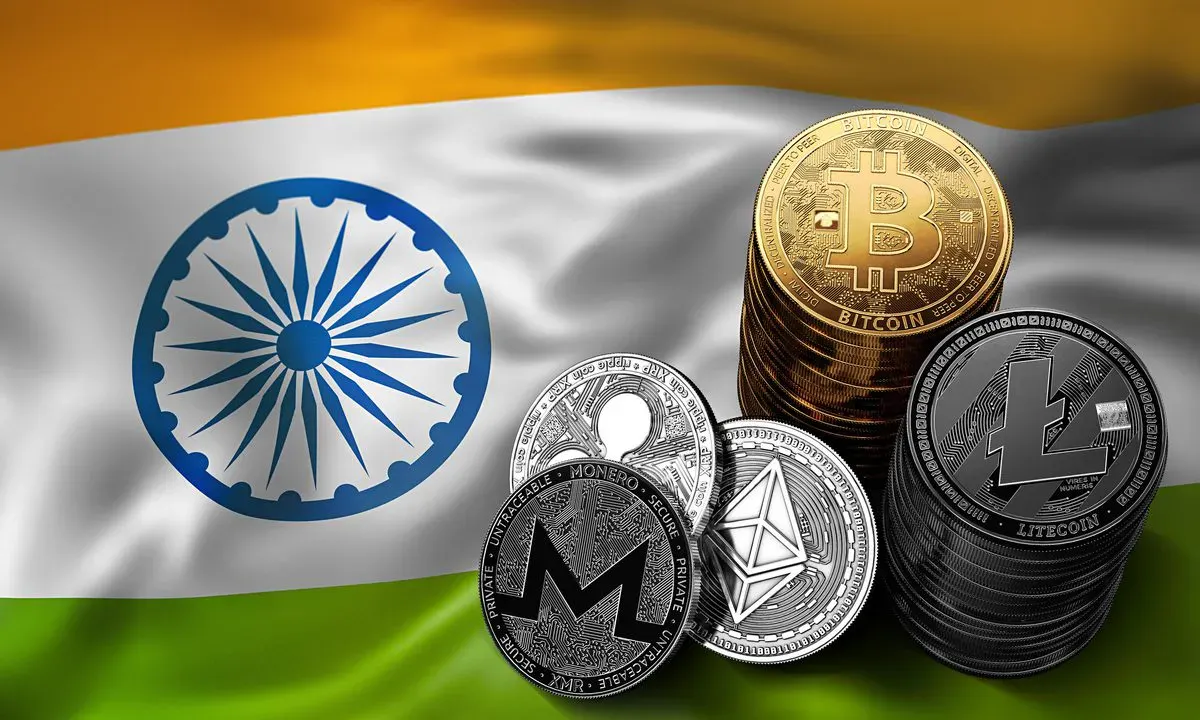on May 13, 2024
by Gnosis
in Research Hub
India, the world's second-most populous country with over 1.4 billion people, has emerged as a frontrunner in grassroots cryptocurrency adoption. Despite the challenges posed by the country's economic landscape, India has witnessed a significant surge in cryptocurrency usage, with estimates suggesting that the number of cryptocurrency users in India could reach between 156 million and 270 million in 2023.

This remarkable adoption rate has propelled India to become the second-largest cryptocurrency market in the world by raw estimated transaction volume, surpassing even wealthier nations. In 2023 alone, India received an estimated $268.9 billion in crypto assets, accounting for a substantial portion of the global transaction volume.

However, India's cryptocurrency landscape has been shaped by a complex legal and regulatory environment. The country imposes a unique tax regime on cryptocurrency transactions, with a 30% tax on gains and a 1% tax deducted at source (TDS) on all transactions. These high tax rates have had a significant impact on trading volumes, with some estimates suggesting a decline of more than 90% between April 2022 and July 2023.
In addition to the tax implications, the Indian government has taken steps to regulate the cryptocurrency market. In December 2023, the Finance Ministry issued show cause notices to nine offshore platforms for non-compliance with the Prevention of Money Laundering Act (PMLA). Subsequently, in January 2024, the IT Ministry blocked access to the URLs and mobile apps of these nine entities, including popular exchanges such as Binance, Kucoin, and OKX. However, in the past few recent days, exchanges such as Binance and Kucoin have been cleared to continue operations.
https://economictimes.indiatimes.com/markets/cryptocurrency/financial-intelligence-unit-clears-binance-and-kucoin-to-be-virtual-asset-service-providers/articleshow/110016938.cms?from=mdr
The regulatory actions have led to a shift in user behavior, with many Indian investors turning to local exchanges to continue their cryptocurrency trading activities. This trend has created opportunities for domestic players to capture market share and fill the void left by the blocked offshore platforms.
Despite the regulatory challenges, India's cryptocurrency market continues to thrive, driven by the country's tech-savvy population and the growing interest in alternative financial solutions. As the landscape evolves, it is crucial to examine the usage patterns, portfolio preferences, and the competitive landscape of the Indian cryptocurrency market to understand the future trajectory of this dynamic industry.
Market Landscape & Opportunities and Challenges
The Indian cryptocurrency exchange market is characterized by intense competition, with several local players vying for market share. Among the key players are CoinSwitch, India's largest crypto app with nearly 20 million users, backed by prominent investors such as a16z, Tiger Global, and Sequoia Capital India. WazirX, another major exchange, boasts over 5 million users and reported a total trading volume of approximately 1 billion USDT in 2023, a significant decline from the $10 billion and $43 billion recorded in 2022 and 2021, respectively.
Other notable exchanges in the Indian market include Coin DCX, which launched in 2018 and offers services such as margin trading, futures, lending, and staking, and reported 14 million users in 2023. ZebPay, launched in 2014, has 5 million users and offers unique features like crypto lending, allowing users to earn fixed interest at 4%. BitBNS, launched in 2017, provides a platform for both spot and derivative trading, while UnoCoin, India's oldest crypto exchange launched in 2013, remains popular among traders as a specialized platform for Bitcoin trading.
The impact of regulations on trading volumes and user behavior has been significant, with projects reporting substantial decreases in volume, primarily due to government taxes and regulations. However, the national ban on popular offshore exchanges such as Binance has created opportunities for local platforms. Exchanges like CoinDCX, CoinSwitch, Unocoin, and BuyUcoin witnessed massive surges in registrations and deposits, ranging from 100% to 2,000%, as investors sought to protect their assets.
The current landscape presents both opportunities and challenges for market participants. The regulatory uncertainty surrounding the future of the cryptocurrency landscape in India has created a space for smaller players to maneuver and adapt to changing market conditions.
The lack of clear regulatory frameworks and the potential for further government interventions pose significant challenges for the industry. Market participants must remain agile and prepared to pivot their strategies in response to evolving regulations. Establishing trust with users, ensuring compliance with existing laws, and actively engaging with regulators will be crucial for the long-term success of cryptocurrency projects in India.
India's cryptocurrency market is a dynamic and rapidly evolving landscape, shaped by a combination of strong grassroots adoption, regulatory challenges, and intense competition among local exchanges. Despite the obstacles posed by high taxes and government actions, India remains a leader in cryptocurrency adoption, driven by a tech-savvy population and a growing interest in alternative financial solutions.
As the market navigates the uncertainties of the regulatory environment, opportunities arise for local exchanges to capture market share and for international projects to forge strategic partnerships. The ability to adapt to changing conditions and pivot strategies will be crucial for market participants to thrive in this challenging yet promising landscape.
The future of India's cryptocurrency market is intricately tied to the country's economic growth, technological advancements, and regulatory developments. By fostering innovation, promoting responsible adoption, and engaging in constructive dialogue with regulators, the industry can unlock the vast potential of India's cryptocurrency market and pave the way for a more inclusive and empowered financial future.
More articles

